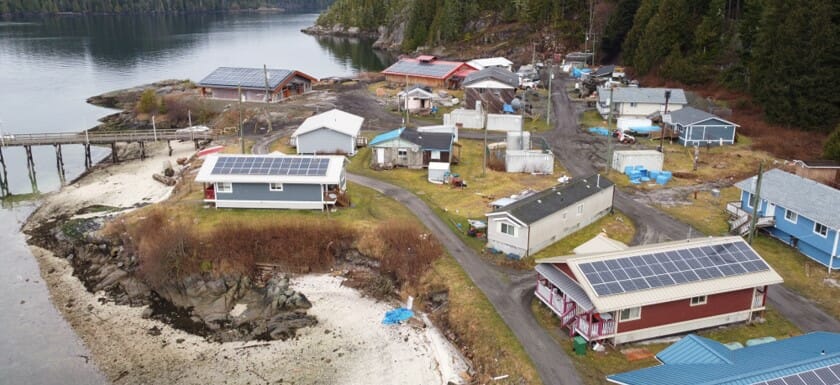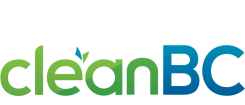Estimated Reading time

3 Mins
Announcing a New $29-Million Fund for Remote Communities to Switch from Diesel to Renewables
The New Relationship Trust, Coast Funds, and the Province of British Columbia are launching the Community Energy for Diesel Reduction program, a three-year $29-million investment in communities transitioning from diesel-generated electricity to renewable energy sources.

Community Energy Diesel Reduction (CEDR) is a key part of the Province’s CleanBC Remote Community Energy Strategy, which aims to reduce diesel consumption for generating electricity by 80 per cent by 2030.
To deliver this program, the Province has partnered with the New Relationship Trust (NRT) to facilitate investments with remote communities for community energy planning, energy efficiency projects, and renewable energy infrastructure. Coast Funds is working with NRT to support applications from First Nations with communities in the Great Bear Rainforest and Haida Gwaii that rely on diesel to meet their electricity needs.
“Communities that rely on diesel fuel for electricity have dealt with decades of high costs, unreliable power, and environmental risks,” says Dallas Smith, chair of Coast Funds’ board of directors. “Through the CEDR program, First Nations and remote communities can invest in the planning, efficiency, and renewable systems they need to meet their needs without having to rely on imported fuel.”
The CEDR program builds on the successes and learnings from the Renewable Energy for Remote Communities (RERC) program, a $7.9-million investment in First Nations’ renewable energy projects that was launched in 2020. Through that program, the Dzawada̱ʼenux̱w First Nation and Kitasoo / Xai’xais First Nation invested in hydropower facilities that, over their lifetimes, will eliminate more than 175,000 tonnes of greenhouse gas emissions.
“The Renewable Energy for Remote Communities program showed us that communities want to move to sustainable energy and want access to flexible financing that meets their needs,” says Shehin Rahemtulla, sustainable energy manager at Coast Funds. “With the CEDR program, we’re able to support communities at multiple points in their energy journey, and to combine financing with mentorship.”
“[CEDR] represents the collective motivation to bring shared best practices … to address the energy inequalities and energy poverty in remote communities,” says NRT CEO Walter Schneider.
Through CEDR, $9 million is available for investment in demand-side measures that reduce the need for electricity, such as energy assessments, heat pumps, and building envelope retrofits. Another $20 million is available for investments in community energy planning and in renewable energy projects, such as hydro, wind, solar photo-voltaic, biomass, energy storage, and transmission systems for delivering electricity to a community.
Eligibility
The CEDR program can support sustainable energy projects in 44 different communities, including 11 First Nation communities in the Great Bear Rainforest and Haida Gwaii:
- Dzawada’enuxw Nation – Ukwanalis Kingcome Inlet
- Gitga’at Nation – Txalgiux Hartley Bay
- Gwawaenuk Nation – Heghums Hopetown
- Haida Nation – Old Masset, Skidegate
- Haíɫzaqv (Heiltsuk) Nation – Wáglísla Bella Bella
- Kitasoo / Xai’xais Nation – Klemtu
- Kwikwasut’inuxw Haxwa’mis First Nation – Gwa’yas’dums Gilford Island
- Nuxalk Nation – Bella Coola
- Ulkatcho Nation – Anahim Lake
- Wuikinuxv Nation – Oweekeno Rivers Inlet
For more details on project eligibility, visit the New Relationship Trust’s website to access the funding guide.
Application Process
Coast Funds and the New Relationship Trust will work with all eligible First Nations and remote communities to develop strong proposals that maximize access to this exciting investment. The application process, which is now open, follows two steps: a short meeting to discuss your project (expression of interest), followed by a written application.
Coast Funds’ sustainable energy manager, Shehin Rahemtulla, will be engaging with the 11 eligible First Nations Coast Funds serves to support their applications.
To learn more, or to schedule a meeting to discuss project eligibility, email cedr@nrtf.ca.
CEDR Partners
![]()
The New Relationship Trust is an independent organization established by the New Relationship Trust Act (2006). It is dedicated to delivering grant programs to First Nations throughout B.C. and working with governments and organizations to leverage funding sources that build First Nations’ capacity towards self-determination and improved environmental, governmental, social, and economic outcomes.
![]()
Coast Funds is an Indigenous-led conservation finance organization supporting First Nations’ investments in community well-being and ecological integrity in the Great Bear Rainforest and Haida Gwaii. Founded in 2007 with $118 million in contributions from foundations and Crown governments, Coast Funds has approved $107.7 million towards 434 stewardship, renewable energy, and economic development projects.

The Government of British Columbia’s CleanBC Plan is a pathway to a more prosperous, balanced, and sustainable future. CleanBC funding supports project planning, feasibility and design in Indigenous and civic communities working to advance energy efficiency and clean energy projects.
The CleanBC Remote Community Energy Strategy is a multi-stakeholder effort to reduce diesel electricity generation and heating in remote communities by 80 per cent by 2030. The Ministry of Energy, Mines, and Low Carbon Innovation is developing the strategy in collaboration with First Nations and several key partners.
